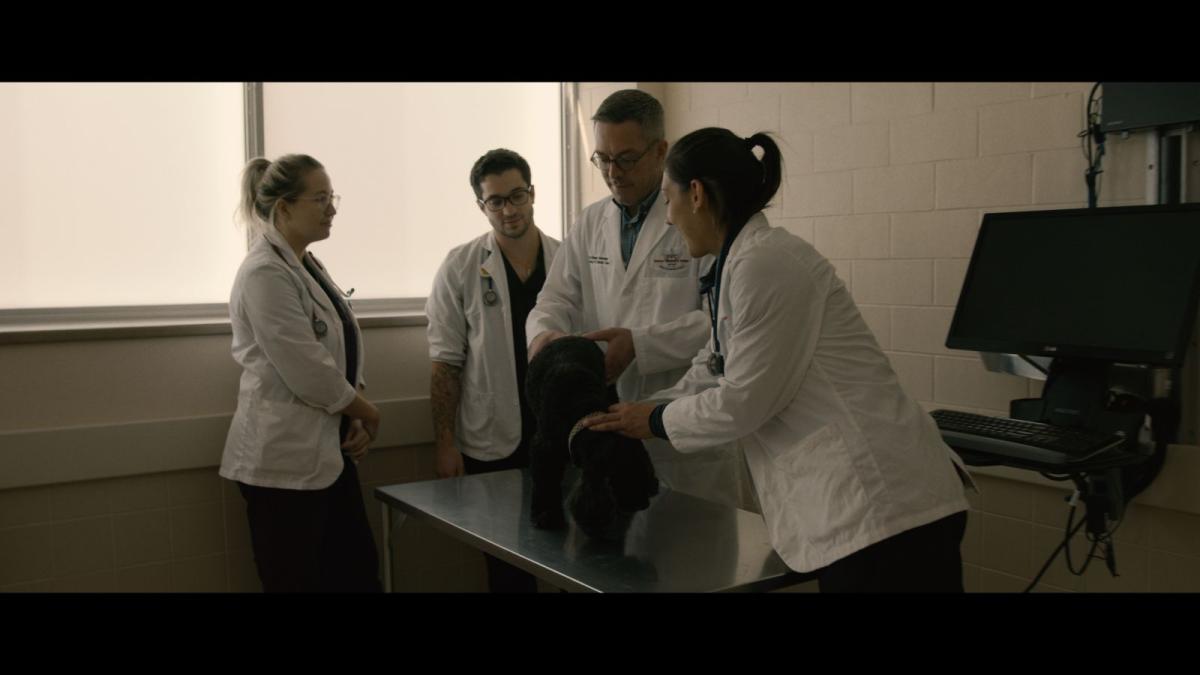Remy’s Fund provides improved access to veterinary care for vulnerable and disadvantaged communities
 The human-animal bond is critical to the health of many individuals, families and communities. According to the Canadian Animal Health Institute, it is estimated that more than half of Canadians share their life with a pet.
The human-animal bond is critical to the health of many individuals, families and communities. According to the Canadian Animal Health Institute, it is estimated that more than half of Canadians share their life with a pet.
Each year, countless people cannot afford to pay for basic veterinary care. This financial barrier can lead to poor health outcomes for pets and the people who care for them. Historically, veterinary education has not focused on addressing this social inequity. The Ontario Veterinary College (OVC) and many community-based veterinarians are addressing these and other social justice issues with a goal of creating compelling, sustainable and equitable ways to improve access to care, including providing subsidies for treatment for pets of qualified clients.
In 2019, long-time OVC supporters Kim and Stu Lang kick-started Remy’s Fund with a $1-million endowment donation. A program of OVC Pet Trust, the fund is named in memory of the Lang’s beloved dog Remy, a yellow Labrador Retriever they rescued. Two years later, the care Remy received at OVC saved her life. Remy’s Fund is part of a larger gift to create the $11 million Kim and Stu Lang Community Healthcare Partnership Program (CHPP), which is aimed at making veterinary care more affordable and accessible for underserved communities, including Indigenous communities as well as individuals who are experiencing poverty or housing insecurity.
In photo: llustration of Kim and Stu Lang's dog, Remy, by Jane Dawkins.Happy Outcomes Wanted
Since the CHPP was announced in 2019, OVC leaders have created a set of initial guidelines for how Remy’s Fund will be managed, which will expand in the years to come as the fund grows through further donations. The fund is currently directed toward supporting pets and families from communities where OVC has established relationships and has done pro bono work in the past.
The fund will be used for medical expenses beyond basic preventive care. Dr. Shane Bateman, interim director of CHPP says, “We are still in the early days of establishing this fund, but for now it will be devoted to supporting the medical expenses of animals that have a good prognosis for one-time treatments that do not require ongoing or chronic care. We want to make choices that allow for as many happy outcomes as possible.”
Remy’s Fund has been put to work rather quickly during the pandemic. “When a client contacts us from a community where we are already providing outreach services, we have been able to triage the situation virtually. If we feel the patient needs specialized care and the family can get them to a nearby clinic, we provide financial support to qualified pets who meet the established criteria for patient eligibility.”
Care for Pets + Experiential Learning for Students
 The CHPP project supports teams of student veterinarians to provide in-community preventive care such as spay and neuter procedures and vaccinations. When the team encounters patients who need additional care, or pets fall ill in between visits, then Remy’s Fund will be utilized to support those families using a new model called incremental care, which involves critically assessing the patient and prioritizing diagnostics and treatments that match the client’s resources or budget. Bateman expects that within three years, once the CHPP curriculum changes – which will include new clinical rotations and increased experiential learning opportunities – are implemented at OVC, Remy’s Fund will not only support families needing extra medical care, but will be critical in helping students to understand incremental care.
The CHPP project supports teams of student veterinarians to provide in-community preventive care such as spay and neuter procedures and vaccinations. When the team encounters patients who need additional care, or pets fall ill in between visits, then Remy’s Fund will be utilized to support those families using a new model called incremental care, which involves critically assessing the patient and prioritizing diagnostics and treatments that match the client’s resources or budget. Bateman expects that within three years, once the CHPP curriculum changes – which will include new clinical rotations and increased experiential learning opportunities – are implemented at OVC, Remy’s Fund will not only support families needing extra medical care, but will be critical in helping students to understand incremental care.
“Remy’s Fund will do a lot of good work in these communities, and practical learning at this level is profoundly engaging and formative for students,” says Bateman.
Inspire + Catalyze Positive Change
In addition to Indigenous communities, Remy’s Fund will play an important role in supporting pets of families and individuals experiencing poverty or trauma.
“For a person who has experienced trauma or violence by other humans, pets can be an important, loving, unconditional relationship in their life,” says Bateman. “Pets are critical to a person’s welfare and mental health, especially when other areas of their life are unstable.”
Bateman is deeply grateful to Kim and Stu Lang for their vision to create CHPP.
“This program will allow OVC to be a leader in understanding how best to demonstrate the impact that providing veterinary care and improving animal health can ultimately have on human health and the health of the community,” he says. “Most important, CHPP will inspire and catalyze positive change in the veterinary profession, arming the next generation of veterinarians with confidence, cultural competence and leader-ship skills to serve their communities and ultimately make the world a better place.”
To give to Remy's Fund visit pettrust.ca/donate.
Read more about the OVC CHPP team.
What is The Kim and Stu Lang Community Healthcare Partnership Program (CHPP)?
Established in 2019 with an $11-million donation – the largest single gift received by the University of Guelph’s Ontario Veterinary College – The Kim and Stu Lang Community Healthcare Partnership Program (CHPP) aims to:
- Identify, understand and remove barriers that impede access to animal healthcare;
- Train veterinarians who will support and lead programs that expand access to care for underserved populations;
- Research best practices and inform policy, promoting a One Health approach to provision of health services for vulnerable animals and those who care for them.

